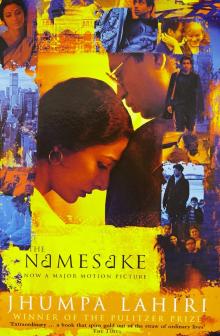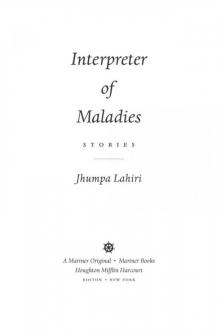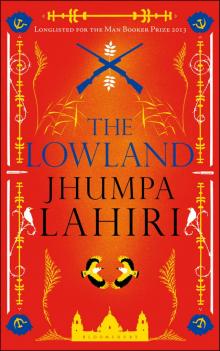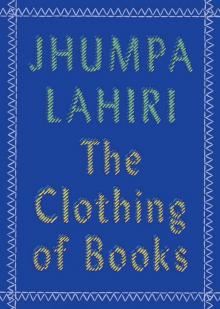- Home
- Jhumpa Lahiri
The Namesake Page 5
The Namesake Read online
Page 5
Letters arrive from her parents, from her husband's parents, from aunts and uncles and cousins and friends, from everyone, it seems, but Ashima's grandmother. The letters are filled with every possible blessing and good wish, composed in an alphabet they have seen all around them for most of their lives, on billboards and newspapers and awnings, but which they see now only in these precious, pale blue missives. Sometimes two letters arrive in a single week. One week there are three. As always Ashima keeps her ear trained, between the hours of twelve and two, for the sound of the postman's footsteps on the porch, followed by the soft click of the mail slot in the door. The margins of her parents' letters, always a block of her mother's hasty penmanship followed by her father's flourishing, elegant hand, are frequently decorated with drawings of animals done by Ashima's father, and Ashima tapes these on the wall over Gogol's crib. "We are dying to see him," her mother writes. "These are the most crucial months. Every hour there is a change. Remember it." Ashima writes back with careful descriptions of her son, reporting the circumstances of his first smile, the day he first rolls over, his first squeal of delight. She writes that they are saving money for a trip home the following December, after Gogol turns one. (She does not mention the pediatrician's concern about tropical diseases. A trip to India will require a whole new set of immunizations, he has warned.)
In November, Gogol develops a mild ear infection. When Ashima and Ashoke see their son's pet name typed on the label of a prescription for antibiotics, when they see it at the top of his immunization record, it doesn't look right; pet names aren't meant to be made public in this way. But there is still no letter from Ashima's grandmother. They are forced to conclude that it is lost in the mail. Ashima decides to write to her grand mother, explaining the situation, asking her to send a second letter with the names. The very next day a letter arrives in Cambridge. Though it is from Ashima's father, no drawings for Gogol adorn the margins, no elephants or parrots or tigers. The letter is dated three weeks ago, and from it they learn that Ashima's grandmother has had a stroke, that her right side is permanently paralyzed, her mind dim. She can no longer chew, barely swallows, remembers and recognizes little of her eighty-odd years. "She is with us still, but to be honest we have already lost her," her father has written. "Prepare yourself, Ashima. Perhaps you may not see her again."
It is their first piece of bad news from home. Ashoke barely knows Ashima's grandmother, only vaguely recalls touching her feet at his wedding, but Ashima is inconsolable for days. She sits at home with Gogol as the leaves turn brown and drop from the trees, as the days begin to grow quickly, mercilessly dark, thinking of the last time she saw her grandmother, her dida, a few days before flying to Boston. Ashima had gone to visit her; for the occasion her grandmother had entered the kitchen after over a decade's retirement, to cook Ashima a light goat and potato stew. She had fed her sweets with her own hand. Unlike her parents, and her other relatives, her grandmother had not admonished Ashima not to eat beef or wear skirts or cut off her hair or forget her family the moment she landed in Boston. Her grandmother had not been fearful of such signs of betrayal; she was the only person to predict, rightly, that Ashima would never change. Before leaving, Ashima had stood, her head lowered, under her late grandfather's portrait, asking him to bless her journey. Then she bent down to touch the dust of her dida's feet to her head.
"Dida, I'm coming," Ashima had said. For this was the phrase Bengalis always used in place of good-bye.
"Enjoy it," her grandmother had bellowed in her thundering voice, helping Ashima to straighten. With trembling hands, her grandmother had pressed her thumbs to the tears streaming down Ashima's face, wiping them away. "Do what I will never do. It will all be for the best. Remember that. Now go."
As the baby grows, so, too, does their circle of Bengali acquaintances. Through the Nandis, now expecting a child of their own, Ashoke and Ashima meet the Mitras, and through the Mitras, the Banerjees. More than once, pushing Gogol in his stroller, Ashima has been approached on the streets of Cambridge by young Bengali bachelors, shyly inquiring after her origins. Like Ashoke, the bachelors fly back to Calcutta one by one, returning with wives. Every weekend, it seems, there is a new home to go to, a new couple or young family to meet. They all come from Calcutta, and for this reason alone they are friends. Most of them live within walking distance of one another in Cambridge. The husbands are teachers, researchers, doctors, engineers. The wives, homesick and bewildered, turn to Ashima for recipes and advice, and she tells them about the carp that's sold in Chinatown, that it's possible to make halwa from Cream of Wheat. The families drop by one another's homes on Sunday afternoons. They drink tea with sugar and evaporated milk and eat shrimp cutlets fried in saucepans. They sit in circles on the floor, singing songs by Nazrul and Tagore, passing a thick yellow clothbound book of lyrics among them as Dilip Nandi plays the harmonium. They argue riotously over the films of Ritwik Ghatak versus those of Satyajit Ray. The CPIM versus the Congress party. North Calcutta versus South. For hours they argue about the politics of America, a country in which none of them is eligible to vote.
By February, when Gogol is six months old, Ashima and Ashoke know enough people to entertain on a proper scale. The occasion: Gogol's annaprasan, his rice ceremony. There is no baptism for Bengali babies, no ritualistic naming in the eyes of God. Instead, the first formal ceremony of their lives centers around the consumption of solid food. They ask Dilip Nandi to play the part of Ashima's brother, to hold the child and feed him rice, the Bengali staff of life, for the very first time. Gogol is dressed as an infant Bengali groom, in a pale yellow pajamapunjabi from his grandmother in Calcutta. The fragrance of cumin seeds, sent in the package along with the pajamas, lingers in the weave. A headpiece that Ashima cut out of paper, decorated with pieces of aluminum foil, is tied around Gogol's head with string. He wears a thin fourteen-karat gold chain around his neck. His tiny forehead has been decorated with considerable struggle with sandalwood paste to form six miniature beige moons floating above his brows. His eyes have been darkened with a touch of kohl. He fidgets in the lap of his honorary uncle, who sits on a bedcover on the floor, surrounded by guests in front and behind and beside him. The food is arranged in ten separate bowls. Ashima regrets that the plate on which the rice is heaped is melamine, not silver or brass or at the very least stainless-steel. The final bowl contains payesh, a warm rice pudding Ashima will prepare for him to eat on each of his birthdays as a child, as an adult even, alongside a slice of bakery cake.
He is photographed by his father and friends, frowning, as he searches for his mother's face in the crowd. She is busy setting up the buffet. She wears a silvery sari, a wedding gift worn for the first time, the sleeves of her blouse reaching the crook of her elbow. His father wears a transparent white Punjabi top over bell-bottom trousers. Ashima sets out paper plates that have to be tripled to hold the weight of the biryani, the carp in yogurt sauce, the dal, the six different vegetable dishes she'd spent the past week preparing. The guests will eat standing, or sitting cross-legged on the floor. They've invited Alan and Judy from upstairs, who look as they always do, in jeans and thick sweaters because it is cold, leather sandals buckled over woolly socks. Judy eyes the buffet, bites into something that turns out to be a shrimp cutlet. "I thought Indians were supposed to be vegetarian," she whispers to Alan.
Gogol's feeding begins. It's all just a touch, a gesture. No one expects the boy to eat anything more than a grain of rice here, a drop of dal there—it is all meant to introduce him to a lifetime of consumption, a meal to inaugurate the tens of thousands of unremembered meals to come. A handful of women ululate as the proceedings begin. A conch shell is repeatedly tapped and passed around, but no one in the room is able to get it to emit a sound. Blades of grass and a pradeep's slim, steady flame are held to Gogol's head. The child is entranced, doesn't squirm or turn away, opens his mouth obediently for each and every course. He takes his payesh three times. Ashima's eyes fill with tears as Gogol
's mouth eagerly invites the spoon. She can't help wishing her own brother were here to feed him, her own parents to bless him with their hands on his head. And then the grand finale, the moment they have all been waiting for. To predict his future path in life, Gogol is offered a plate holding a clump of cold Cambridge soil dug up from the backyard, a ballpoint pen, and a dollar bill, to see if he will be a landowner, scholar, or businessman. Most children will grab at one of them, sometimes all of them, but Gogol touches nothing. He shows no interest in the plate, instead turning away, briefly burying his face in his honorary uncle's shoulder.
"Put the money in his hand!" someone in the group calls out. "An American boy must be rich!"
"No!" his father protests. "The pen. Gogol, take the pen."
Gogol regards the plate doubtfully. Dozens of dark heads hover expectantly. The material of the Punjabi pajama set begins to scratch his skin.
"Go on, Gogol, take something," Dilip Nandi says, drawing the plate close. Gogol frowns, and his lower lip trembles. Only then, forced at six months to confront his destiny, does he begin to cry.
Another August. Gogol is one, grabbing, walking a little, repeating words in two languages. He calls his mother "Ma," his father "Baba." If a person in the room says "Gogol," he turns his head and smiles. He sleeps through the night and between noon and three each day. He has seven teeth. He constantly attempts to put the tiniest scraps of paper and lint and whatever else he finds on the floor into his mouth. Ashoke and Ashima are planning their first trip to Calcutta, in December, during Ashoke's winter break. The upcoming journey inspires them to try to come up with a good name for Gogol, so they can submit his passport application. They turn to their Bengali friends for suggestions. Long evenings are devoted to considering this name or that. But nothing appeals to them. By then they've given up on the letter from Ashima's grandmother. They've given up on her grandmother remembering the name, for Ashima's grandmother, they are told, cannot even remember Ashima. Still, there is time. The trip to Calcutta is four months away. Ashima regrets that they can't go earlier, in time for Durga pujo, but it will be years before Ashoke is eligible for a sabbatical, and three weeks in December is all they can manage. "It is like going home a few months after your Christmas," Ashima explains to Judy one day over the clothesline. Judy replies that she and Alan are Buddhists.
At breakneck speed Ashima knits sweater-vests for her father, her father-in-law, her brother, her three favorite uncles. They are all the same, V-necked, pine green yarn, knit five, purl two, on number-nine needles. The exception is her father's, done in a double-seed stitch with two thick cables and buttons down the front; he prefers cardigans to pullovers, and she remembers to put in pockets for the deck of cards he always carries with him, to play patience at a moment's notice. In addition to the sweater, she buys him three sable-haired paintbrushes from the Harvard Coop, sizes he's requested by mail. Though they are wildly expensive, more so than anything else she's ever bought in America, Ashoke says nothing when he sees the bill. One day Ashima goes shopping in downtown Boston, spending hours in the basement of Jordan Marsh as she pushes Gogol in his stroller, spending every last penny. She buys mismatched teaspoons, percale pillowcases, colored candles, soaps on ropes. In a drugstore she buys a Timex watch for her father-in-law, Bic pens for her cousins, embroidery thread and thimbles for her mother and her aunts. On the train home she is exhilarated, exhausted, nervous with anticipation of the trip. The train is crowded and at first she stands, struggling to hang on to all the bags and the stroller and the overhead strap, until a young girl asks if she'd like to sit down. Ashima thanks her, sinking gratefully into the seat, pushing the bags protectively behind her legs. She is tempted to sleep as Gogol does. She leans her head against the window and closes her eyes and thinks of home. She pictures the black iron bars in the windows of her parents' flat, and Gogol, in his American baby clothes and diapers, playing beneath the ceiling fan, on her parents' four-poster bed. She pictures her father missing a tooth, lost after a recent fall, her mother has written, on the stairs. She tries to imagine how it will feel when her grandmother doesn't recognize her.
When she opens her eyes she sees that the train is standing still, the doors open at her stop. She leaps up, her heart racing. "Excuse me, please," she says, pushing the stroller and herself through the tightly packed bodies. "Ma'am," someone says as she struggles past, about to step onto the platform, "your things." The doors of the subway clamp shut as she realizes her mistake, and the train rolls slowly away. She stands there watching until the rear car disappears into the tunnel, until she and Gogol are the only people remaining on the platform. She pushes the stroller back down Massachusetts Avenue, weeping freely, knowing that she can't possibly afford to go back and buy it all again. For the rest of the afternoon she is furious with herself, humiliated at the prospect of arriving in Calcutta empty-handed apart from the sweaters and the paintbrushes. But when Ashoke comes home he calls the MBTA lost and found; the following day the bags are returned, not a teaspoon missing. Somehow, this small miracle causes Ashima to feel connected to Cambridge in a way she has not previously thought possible, affiliated with its exceptions as well as its rules. She has a story to tell at dinner parties. Friends listen, amazed at her luck. "Only in this country," Maya Nandi says.
One night not long after, they are fast asleep when the telephone rings. The sound rouses them instantly, their hearts hammering as if from the same frightening dream. Ashima knows even before Ashoke answers that it's a call from India. A few months ago, her family had asked in a letter for the phone number in Cambridge, and she had sent it reluctantly in her reply, aware that it would only be a way for bad news to reach her. As Ashoke sits up and takes the receiver, answering in a weary, weakened voice, Ashima prepares herself. She pushes down the crib railing to comfort Gogol, who has begun stirring as a result of the telephone's rings, and reviews the facts in her head. Her grandmother is in her eighties, bedridden, all but senile, unable to eat or talk. The last few months of her life, according to her parents' most recent letter, have been painful, for her grandmother, for those who know her. It was no way to live. She pictures her mother saying all this gently into the next-door neighbors' phone, standing in the neighbors' sitting room. Ashima prepares herself for the news, to accept the fact that Gogol will never meet his great-grandmother, the giver of his lost name.
The room is unpleasantly cold. She picks up Gogol and gets back into bed, under the blanket. She presses the baby to her body for strength, puts him to her breast. She thinks of the cream-colored cardigan bought with her grandmother in mind, sitting in a shopping bag in the closet. She hears Ashoke speaking, saying soberly but loudly enough so that she fears he will wake Alan and Judy upstairs, "Yes, all right, I see. Don't worry, yes, I will." For a while he is silent, listening. "They want to talk to you," he says to Ashima, briefly putting a hand to her shoulder. In the dark, he hands her the phone, and after a moment's hesitation, he gets out of bed.
She takes the phone in order to hear the news for herself, to console her mother. She can't help but wonder who will console her the day her own mother dies, if that news will also come to her in this way, in the middle of the night, wresting her from dreams. In spite of her dread she feels a thrill; this will be the first time she's heard her mother's voice in nearly three years. The first time, since her departure from Dum Dum Airport, that she will be called Monu. Only it isn't her mother but her brother, Rana, on the other end. His voice sounds small, threaded into a wire, barely recognizable through the holes of the receiver. Ashima's first question is what time it is there. She has to repeat the question three times, shouting in order to be heard. Rana tells her it is lunchtime. "Are you still planning to visit in December?" he asks.
She feels her chest ache, moved after all this time to hear her brother call her Didi, his older sister, a term he alone in the world is entitled to use. At the same time she hears water running in the Cambridge kitchen, her husband opening a cupboard for a glass.
"Of course we're coming," she says, unsettled when she hears her echo saying it faintly, less convincingly, once again. "How is Dida? Has anything else happened to her?"

 The Namesake
The Namesake Nobody's Business
Nobody's Business Interpreter of Maladies
Interpreter of Maladies Hell-Heaven
Hell-Heaven The Lowland
The Lowland Unaccustomed Earth
Unaccustomed Earth The Clothing of Books
The Clothing of Books In Other Words
In Other Words The Penguin Book of Italian Short Stories
The Penguin Book of Italian Short Stories